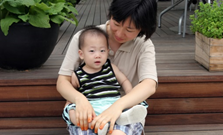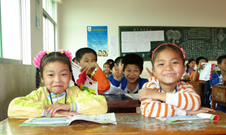Searching While in China
It is best to be prepared to explore any avenue that opens itself up while you are physically in China. Be wary of jumping to conclusions that if a family comes forward and there is a physical resemblance, it’s really your birth family. There are thousands of families who have relinquished a child, or whose child has been trafficked. Be prepared with a plan for DNA testing. It is best to traveling with DNA kits in hand, so that IF the chance arrives, it will be easy to take that step and you don’t waste an important opportunity to know for certain. There is so much uncertainty in this process, don’t allow yourself to leave without DNA if you do meet someone that you believe really could be members of your birth family.
People
 Guide – Make sure you have a guide/translator who is supportive of what you are trying to accomplish. You may want to have a discussion about the fact that you are not the “typical American” tourist, and would like to not only visit these specific spots you’ve identified, but also you would like to have everything translated that is said. Be earnest and share that you are not interested in only the “official information, but simply want to find out what is the real story. In other words, let him/her know you can “handle the truth”, whatever it is and wherever it leads. Don’t be the “ugly N. American” and make demands. Simply share who you are and your desire to know the real facts, not just the official ones.
Guide – Make sure you have a guide/translator who is supportive of what you are trying to accomplish. You may want to have a discussion about the fact that you are not the “typical American” tourist, and would like to not only visit these specific spots you’ve identified, but also you would like to have everything translated that is said. Be earnest and share that you are not interested in only the “official information, but simply want to find out what is the real story. In other words, let him/her know you can “handle the truth”, whatever it is and wherever it leads. Don’t be the “ugly N. American” and make demands. Simply share who you are and your desire to know the real facts, not just the official ones.
-
 Orphanage Director/ Staff - Typically it is best to avoid relying on the orphanage director to make contact with any person with whom you plan to talk to during the search. If any information is false, they have huge interest in maintaining façade of paperwork “official story”. So, any searching one does in China, is usually best done without the knowledge of the director. It has happened that a nanny or other staff member has direct knowledge of a child’s birth family. If you have a reasonable idea that this may be the case, it is critical to arrange a private meeting with that person to pursue conversation with the individual.
Orphanage Director/ Staff - Typically it is best to avoid relying on the orphanage director to make contact with any person with whom you plan to talk to during the search. If any information is false, they have huge interest in maintaining façade of paperwork “official story”. So, any searching one does in China, is usually best done without the knowledge of the director. It has happened that a nanny or other staff member has direct knowledge of a child’s birth family. If you have a reasonable idea that this may be the case, it is critical to arrange a private meeting with that person to pursue conversation with the individual.
- Foster families sometimes possess information on the birth family, but will not speak until a relationship is built and trust is clearly established. Foster families don’t typically speak much in front of orphanage officials, if at all. Orphanage directors typically discourage or sometimes outright “forbid” contact between foster and adoptive families, so it can be challenging to establish a connection. If possible, it is best to arrange a completely private meeting with the foster family and on the foster family’s “turf” so that things are comfortable for them. If you have the contact information prior to arriving in country, it is best to build up relationships over a period of several years and establish a long and strong connection. Don't forget that you are building relationships! That is the way things work in China.
-
 “Finder” – this person is often the most pivotal person in the search process. Your guide will be an important intermediary here in making potential contact with a finder. It’s best to do some research before you arrive in China to ascertain if the listed finder is likely accurate or not. It is essential to prepare a list of questions while at home and you have the time to carefully and thoughtfully prepare a full list of questions you wish to explore. It can be almost impossible for your mind to think of all questions you should touch on once you are in China and are facing a meeting. Don’t discount how emotional that time might be and how your mind may not be razor sharp, based on being out of your element, and other rigors of travel. Once there, you can always toss out a question if it seems irrelevant or redundant.
“Finder” – this person is often the most pivotal person in the search process. Your guide will be an important intermediary here in making potential contact with a finder. It’s best to do some research before you arrive in China to ascertain if the listed finder is likely accurate or not. It is essential to prepare a list of questions while at home and you have the time to carefully and thoughtfully prepare a full list of questions you wish to explore. It can be almost impossible for your mind to think of all questions you should touch on once you are in China and are facing a meeting. Don’t discount how emotional that time might be and how your mind may not be razor sharp, based on being out of your element, and other rigors of travel. Once there, you can always toss out a question if it seems irrelevant or redundant.
Click FINDER QUESTIONS to see list of sample potential question list.
- Hospital workers – if they agree to search any records, they will often ask for written authorization which looks “official”. This can be produced, sometimes with some notarial certificates that your guide can assist you in finding a local notary. Generally people either like to have it totally unofficial or, else have an official document with lots of stamps and seals to “cover themselves” if they are questioned. You need to make sure that everyone you are coming in contact with has a favorable impression of you and work respectfully within the good graces of individuals who may be in a position to lend assistance. Generally the ordinary Chinese citizen is quite sympathetic and intrigued with an adoptee or adoptive family conducting a birth family search. Such an experience is considered an intriguing novelty.
- Police person – Oftentimes, meeting with this person offers some valuable experience, though usually not a lot of valuable insight or leads. It is fairly common for the police offer to recall the exact situation of handling the case of abandonment and, at times one can find new information, such as how long the child spent at the police station, who else the child encountered; the general state of health for the child; any unique items placed with the child; clothes or blankets left with the child, etc. At times, the police person may have taken the child to the hospital for care, or directly to the orphanage. It is generally worthwhile to explore any details from the police report and “chase down” any new informational trails which may come from this. At times, the police person is simply gratified to know what has happened to the child, and is often excited to make that personal connection. The police person may also be able to confirm information shared by the finder, or fill in gaps if the finder cannot be located. One should allow adequate time in the city where the child was found to fully explore this aspect.
Places
China is a huge country with a massive population. However, while you are there, it is quite valuable explore certain locales to further a search. Again, make sure you have a local guide who is supportive and willing to help talk to the locals. Finding place - If this information that you have seems reliable, it is a good place to start, by visiting the finding spot locale and asking around to see if anyone remembers a child being found there. Be prepared to spend some time and explore leads which may surface from these conversations. As the adoptee conducting the search, realize that this aspect could be an intensely emotional rollercoaster for all, as you consider the reality of possibly finding something from these leads that might be different from what you had thought known for years. It’s possible that different options that may present themselves with exploring the finding place. Sometimes in a small community, simply the presence of a foreigner wandering around and asking questions will create “word of mouth” that travels through a close community and someone may seek you out. That is one reason it is helpful to keep your plans loose and anticipate spending several days in the area of the finding location, if feasible.
Finding place - If this information that you have seems reliable, it is a good place to start, by visiting the finding spot locale and asking around to see if anyone remembers a child being found there. Be prepared to spend some time and explore leads which may surface from these conversations. As the adoptee conducting the search, realize that this aspect could be an intensely emotional rollercoaster for all, as you consider the reality of possibly finding something from these leads that might be different from what you had thought known for years. It’s possible that different options that may present themselves with exploring the finding place. Sometimes in a small community, simply the presence of a foreigner wandering around and asking questions will create “word of mouth” that travels through a close community and someone may seek you out. That is one reason it is helpful to keep your plans loose and anticipate spending several days in the area of the finding location, if feasible.
-
 Local Market - At times if nothing much has turned up with other avenues, it can be useful to simply explore the local markets and leisurely strike up conversations (via the guide unless you are a fluent speaker) with local vendors. It is good to have fliers already printed in Mandarin describing your interest in making contact with a birth family member and/or general information on the adoptee with an early photo and local contact information. If you do this, be prepared for handling many irrelevant inquiries, so make certain to hold back much key information, to help you sort out viable leads from false leads. It’s good to start at the local markets near the finding location or other logical spot.
Local Market - At times if nothing much has turned up with other avenues, it can be useful to simply explore the local markets and leisurely strike up conversations (via the guide unless you are a fluent speaker) with local vendors. It is good to have fliers already printed in Mandarin describing your interest in making contact with a birth family member and/or general information on the adoptee with an early photo and local contact information. If you do this, be prepared for handling many irrelevant inquiries, so make certain to hold back much key information, to help you sort out viable leads from false leads. It’s good to start at the local markets near the finding location or other logical spot.
-
 Local Elementary or Middle School - If one can get a visit to a local elementary or middle school in the area, it is possible explore obtaining information from local school children, who may know of a family whose baby “disappeared”, or it could be the case in the pupil’s own family. One doesn’t have to explain a lot. It can be a good strategy to visit a local school and just happen to have information about your child to send home with the school kids (not mentioning searching per se) but including contact information, such as phone number or email, or the guide’s phone number. Oftentimes, at the end of middle school, the advanced students move away to attend high school, or simply don’t continue education after middle school if the area is rural. So, the chances are best to employ this strategy before the adoptee searching is out of high school, otherwise siblings, cousins or neighbor kids who may have potential knowledge may no longer be in China’s local school system.
Local Elementary or Middle School - If one can get a visit to a local elementary or middle school in the area, it is possible explore obtaining information from local school children, who may know of a family whose baby “disappeared”, or it could be the case in the pupil’s own family. One doesn’t have to explain a lot. It can be a good strategy to visit a local school and just happen to have information about your child to send home with the school kids (not mentioning searching per se) but including contact information, such as phone number or email, or the guide’s phone number. Oftentimes, at the end of middle school, the advanced students move away to attend high school, or simply don’t continue education after middle school if the area is rural. So, the chances are best to employ this strategy before the adoptee searching is out of high school, otherwise siblings, cousins or neighbor kids who may have potential knowledge may no longer be in China’s local school system.
Other Resources
- Media - Involving the media (e.g. television or newspaper) seems a simple way to make progress on your search. However, doing so oftentimes delays or interferes with the productivity of the search, due to a huge amount of false leads generated. If other tools are used and the search comes up absolutely empty, then at that point you may consider that this option may be the only viable “last resort” choice to make. If you must take this tactic, be certain to withhold key identifying or personalized elements of the story, so that you can screen out of the plethora of responses you will likely receive. This method may also generate someone just interested in gaining a “connections”; a claim to a foreigner or other unrelated and unpredictable reasons. Or you may encounter a number of other Chinese families who have lost a child and are searching for their child. Click China's Missing Kids to read about that occur then. Involving media often takes you places you and your child never intended the search to go, so it’s best to save this option for such a time as once all other avenues for search are completely exhausted.
- “Baby Come Home” - There is an organization titled, “Baby Come Home” or, www.baobeihuijia.com/ which is a non-profit organization, dedicated to helping birth families locate a child who has gone missing. The police in China often have not been helpful to families whose child is missing. This organization has now gained a good amount of notoriety among Chinese society and work with hundreds of volunteers throughout China. The primary potential drawback to using them is similar to media: once you share information, they may share it farther and wider than you perhaps wish to do. It was started by Zhang Baoyan, a mother whose child went temporarily missing for several hours prior to being found. The experience so startled and alarmed this mom that she began to look at how to improve the search process for other Chinese families whose child has gone missing.
Summary
Often the search reaches critical mass during an in-person visit to China and one can fully exploit and explore the leads uncovered during the “paper search” phase at home. However, it is naïve to think that simply showing up in China will uncover the most unless one has done the research and preparation prior to travel. Also, the more often one is able to go in person, the more likely it is that the connections developed remain viable and potentially lead to important clues to explore now or in the future.
****************************************************************************************************************************************************************************************************************************





